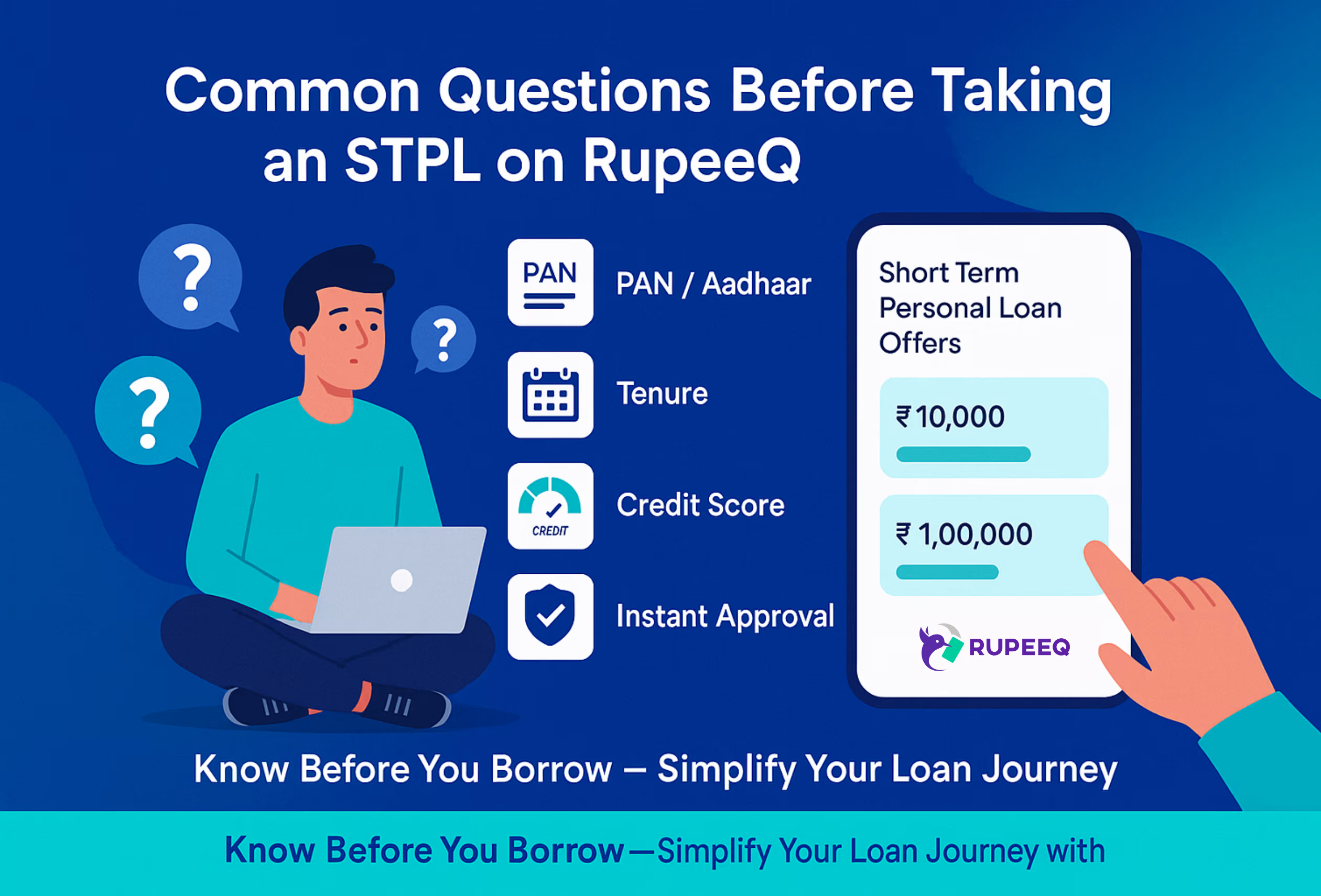A personal loan is often considered a flexible financial tool for home renovation, medical emergencies, education, or business expansion. Unlike home loans or education loans, a personal loan does not directly offer tax benefits under the Income Tax Act. However, if the loan is used for specific purposes, you may be eligible for tax deductions on interest payments under certain sections.
In this blog, we will cover:
- Whether a personal loan is taxable
- How to claim tax benefits on personal loans
- Tax deductions available for home improvement, business, and education expenses
- RupeeQ insights on optimizing tax benefits while using personal loans
Is a Personal Loan Taxable?
No, a personal loan is not taxable because it is considered a liability, not an income. Since the borrower is expected to repay the loan, the amount received is not categorized as income under the Income Tax Act, 1961.
However, tax benefits depend on how the borrowed funds are used. If used for tax-deductible purposes like home renovation, education, or business expansion, the interest paid on the loan may qualify for deductions.
Tax Benefits of Personal Loan Based on Usage
A personal loan does not automatically qualify for tax deductions, but you can avail of tax benefits if the loan is used for specific purposes.
1. Tax Deduction on Personal Loan for Home Purchase or Renovation
If a personal loan is used for buying, constructing, or renovating a house, the interest paid can be claimed as a tax deduction under:
- Section 24(b): Deduction of up to ₹2 lakh per year on interest paid for a self-occupied property.
- For rented properties: No upper limit on interest deduction.
Example:
If you take a personal loan of ₹10 lakh at 12% interest for home renovation and pay ₹1.2 lakh as interest in a year, you can claim this as a deduction under Section 24(b), reducing your taxable income.
2. Tax Benefits on Personal Loan for Business Purposes
If a personal loan is used for business expansion, working capital, or purchasing assets, the interest paid on the loan is treated as a business expense and can be deducted under Section 37(1) of the Income Tax Act.
Why is This Beneficial?
- There is no cap on the deduction amount.
- Reduces the taxable profit of the business, lowering tax liability.
Example:
A business owner takes a ₹15 lakh personal loan at 14% interest and pays ₹2.1 lakh as interest annually. This ₹2.1 lakh is deducted from business profits, reducing the overall tax burden.
RupeeQ Tip – To claim tax deductions, ensure you maintain proper documentation proving that the loan was used exclusively for business.
Can You Get Tax Benefits for Personal Loans Used for Education?
A personal loan does not qualify for education loan tax benefits under Section 80E. However, if the loan is used for higher education expenses (such as tuition fees, books, or living costs), the interest paid may be treated as an education-related expense, making it tax-deductible in some cases.
To qualify for tax benefits, you must:
- Show that the loan amount was used solely for education purposes.
- Maintain records of fee payments, accommodation expenses, and tuition receipts.
RupeeQ Tip – If education financing is your priority, consider an education loan instead of a personal loan, as it offers direct tax deductions under Section 80E.
No Tax Benefits on Personal Loan for Personal Use
If a personal loan is used for the following, no tax benefits are available:
- Wedding expenses
- Travel and vacations
- Medical emergencies (unless linked to a business expense)
- Debt consolidation
Since these expenses do not generate income or contribute to asset creation, the loan interest cannot be deducted from taxable income.
How to Claim Tax Benefits on Personal Loans?
If you qualify for tax benefits, follow these steps to claim deductions:
Step 1: Maintain Proper Documentation
- Keep a bank statement showing loan disbursal and repayments.
- Maintain invoices, receipts, and property documents for home renovation or business expenses.
Step 2: Ensure Loan Usage Matches Claimed Deduction
- If claiming deductions under Section 24(b) (home purchase/renovation), ensure your loan amount was used only for property expenses.
- If claiming deductions for business purposes, record expenses under business books of accounts.
Step 3: Mention Interest Paid in Your Income Tax Return (ITR)
- Use Form 16 or business financial records to declare interest payments as part of your tax filing.
- If required, submit loan-related documents to your chartered accountant (CA) or financial advisor.
Personal Loan vs. Other Loan Tax Benefits
| Loan Type | Tax Benefits Available? | Tax Section | Maximum Deduction |
| Home Loan | Yes | Section 80C, 24(b) | ₹2 lakh on interest + ₹1.5 lakh on principal repayment |
| Education Loan | Yes | Section 80E | No upper limit |
| Personal Loan for Home Renovation | Yes | Section 24(b) | ₹2 lakh (for self-occupied house) |
| Personal Loan for Business | Yes | Section 37(1) | No limit |
| Personal Loan for Wedding/Medical | No | N/A | N/A |
RupeeQ Tip – If tax benefits are your priority, consider home loans or education loans, as they offer direct tax deductions. However, if you need quick financing with flexible use, Apply personal loan is the best option.
Final Thoughts: When Can a Personal Loan Help Reduce Tax Liability?
While personal loans do not offer direct tax benefits, using them for home improvement, business expansion, or education can provide tax deductions on interest payments. If your loan is not eligible for deductions, choosing a lower interest rate and shorter tenure can minimize repayment costs.
Key Takeaways:
- A personal loan is not taxable as it is considered a liability.
- Tax benefits can be claimed if the loan is used for home renovation, business, or education-related expenses.
- No tax deductions are available for weddings, medical emergencies, or travel expenses.
- Interest paid on home renovation loans qualifies under Section 24(b) for deductions.
- Business owners can claim the interest as a business expense, reducing taxable profits.
If you’re considering a personal loan for eligible tax-saving purposes, compare the best loan offers on RupeeQ today to maximize financial benefits.







